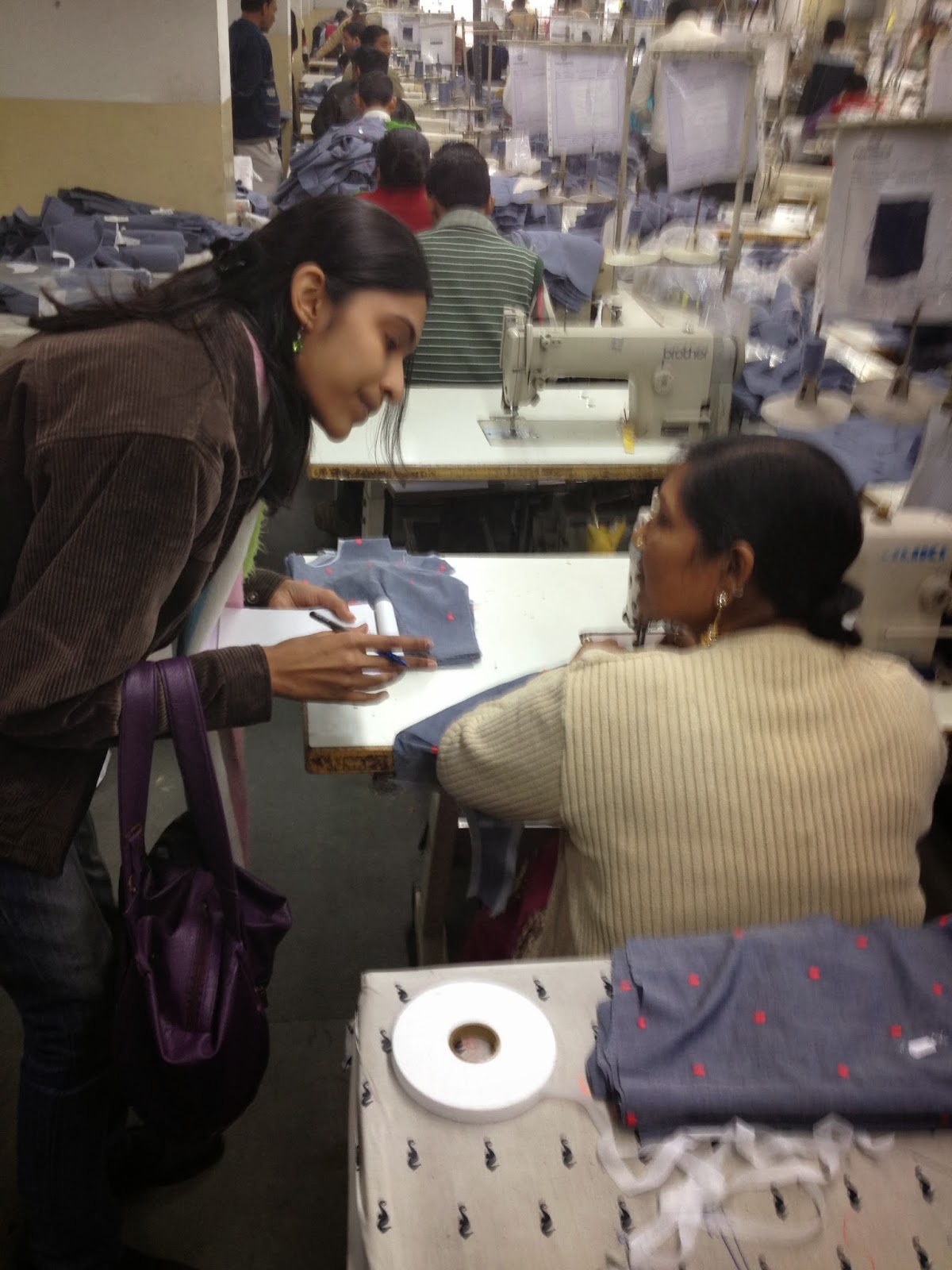After a weeklong orientation course at Jawaharlal Nehru University, the students conducted two weeks of intensive fieldwork on behalf of the Society for Labour and Development, an NGO based in New Delhi. Professor Marouf and Jennifer Rosenbaum, Legal Director of the New Orleans Workers’ Center for Racial Justice, co-taught the program.
Garment Industry Conditions
 Boyd students Matthew Beckstead, Oscar Peralta, and Silvia Villanueva, along with Candace Ruocco (JD, PhD candidate at Saint Louis University), investigated garment factories that produce clothing for Tier 1 multinational corporations, such as American Eagle and Gap, documenting serious health and safety violations. Their access to these factories was itself a breakthrough that sheds new light on the Indian garment industry.
Boyd students Matthew Beckstead, Oscar Peralta, and Silvia Villanueva, along with Candace Ruocco (JD, PhD candidate at Saint Louis University), investigated garment factories that produce clothing for Tier 1 multinational corporations, such as American Eagle and Gap, documenting serious health and safety violations. Their access to these factories was itself a breakthrough that sheds new light on the Indian garment industry.The project helps stitch together the links between clothes sold in the United States and working conditions for those who make them. The students are currently exploring innovative legal strategies, both domestic and international, for holding corporations accountable for health and safety violations in their supply chains. These strategies combine law and organizing in creative ways.
Sexual Harassment in the Workplace
Jennifer Medina, Whitney Short, and Tyler Winkler explored whether India’s groundbreaking new anti-sexual harassment law is actually being implemented in garment factories. Jennifer Medina (2L) notes that employers tell women to “work as if you’re deaf,” instead of actually trying to stop the sexual harassment. Based on interviews with garment workers, managers, and government officials, the students are drafting a report that documents their findings.
A grassroots program for women’s empowerment in India is already using the students’ insights in establishing anti-sexual harassment committees in garment factories to ensure a free and fair working environment for women. The report will help bring greater attention to the need for implementation of the new law. Whitney Short explained that the project helped her understand that “some problems are much deeper than what they seem.” She now realizes that “you must fight from all angles.”
Exploitation of Domestic Workers
Bryn Esplin and Katelyn Franklin examined the exploitation of domestic workers, who often remain legally and socially invisible. As Bryn Esplin (3L) noted, “domestic workers are swept under the rug.” The students conducted interviews with domestic workers and recruiters, identified gaps in legal protection, and provided legal research and advocacy stemming from a highly controversial case that strained U.S.-Indian relations.
The case involved an Indian consular official based in New York who brought a domestic worker to the United States and allegedly violated her rights in multiple ways. The students unpacked complex legal issues regarding consular and diplomatic immunity, and explored challenging strategic questions, such as when to invoke the offense of human trafficking. Katelyn Franklin (3L) says she “learned more about the law . . . in three weeks than [she] could have in a traditional twelve week doctrinal course,” and she left Indian feeling like she “had made a difference.” The students’ research has proven useful to domestic workers’ organizations in both India and the United States.
Treatment of Foreign Nurses
Students also addressed the exploitation of workers who are traditionally considered to be more “highly skilled.” Brady Briggs, Robert Loftus, and Virgilio (“Bing”) Longakit focused on fraud and abuse in the international recruitment of nurses. Based on interviews they conducted with nurses in New Delhi and Las Vegas, the students are preparing a shadow report for the World Health Organization about the treatment of foreign nurses in the United States.
They are also drafting an article for the Nevada Board of Nursing that focuses on conditions for foreign nurses here in Las Vegas. The students’ research on the legal status of recruitment agents in India will also help advance advocacy by the Society for Labour and Development on this issue.
The International and Comparative Human Rights Practicum, now in its fourth year, continues to engage Boyd students in groundbreaking research and advocacy. By forging international alliances that advance the dignity of all people, our students have shown that UNLV’s laboratory for justice knows no borders.



No comments :
Post a Comment